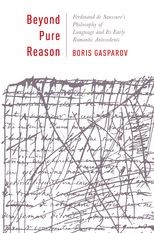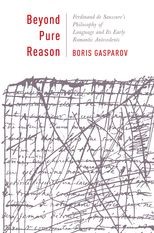Beyond Pure Reason: Ferdinand de Saussure's Philosophy of Language and Its Early Romantic Antecedents
Beyond Pure Reason: Ferdinand de Saussure's Philosophy of Language and Its Early Romantic Antecedents
Cite
Abstract
The Swiss linguist Ferdinand de Saussure (1857–1913) revolutionized the study of language, signs, and discourse in the twentieth century. He successfully reconstructed the proto-Indo-European vowel system, advanced a conception of language as a system of arbitrary signs made meaningful through kinetic interrelationships, and developed a theory of the anagram so profound it gave rise to poststructural literary criticism. The roots of these disparate, even contradictory achievements lie in the thought of Early German Romanticism, which Saussure consulted for its insight into the nature of meaning and discourse. Conducting an analysis of Saussure's intellectual heritage, the book links Sassurean notions of cognition, language, and history to early Romantic theories of cognition and the transmission of cultural memory. In particular, several fundamental categories of Saussure's philosophy of language, such as the differential nature of language, the mutability and immutability of semiotic values, and the duality of the signifier and the signified, are rooted in early Romantic theories of “progressive” cognition and child cognitive development. The book casts the seeming contradictions and paradoxes of Saussure's work as a genuine tension between the desire to bring linguistics and semiotics in line with modernist epistemology on the one hand, and Jena Romantics' awareness of language's dynamism and its transcendence of the boundaries of categorical reasoning on the other. Advancing a radical new understanding of Saussure, the book reveals aspects of the intellectual's work previously overlooked by both his followers and his postmodern critics.
-
Front Matter
- Introduction: Saussure, “Saussurism,” and “Saussurology”
-
Part I Voluble Silence: Saussure and His Legacy
-
Part 2 Postulates About Language and Their Demise
-
Part 3 Language in Discourse
-
End Matter
Sign in
Personal account
- Sign in with email/username & password
- Get email alerts
- Save searches
- Purchase content
- Activate your purchase/trial code
Institutional access
-
Sign in through your institution
- Sign in with a library card Sign in with username/password Recommend to your librarian
Institutional account management
Sign in as administratorPurchase
Our books are available by subscription or purchase to libraries and institutions.
Purchasing information| Month: | Total Views: |
|---|---|
| December 2022 | 1 |
| January 2023 | 3 |
| January 2023 | 1 |
| January 2023 | 2 |
| April 2023 | 1 |
| April 2023 | 1 |
| May 2023 | 1 |
| October 2023 | 1 |
| November 2023 | 1 |
| December 2023 | 1 |
| January 2024 | 1 |




Get help with access
Institutional access
Access to content on Oxford Academic is often provided through institutional subscriptions and purchases. If you are a member of an institution with an active account, you may be able to access content in one of the following ways:
IP based access
Typically, access is provided across an institutional network to a range of IP addresses. This authentication occurs automatically, and it is not possible to sign out of an IP authenticated account.
Sign in through your institution
Choose this option to get remote access when outside your institution. Shibboleth/Open Athens technology is used to provide single sign-on between your institution’s website and Oxford Academic.
If your institution is not listed or you cannot sign in to your institution’s website, please contact your librarian or administrator.
Sign in with a library card
Enter your library card number to sign in. If you cannot sign in, please contact your librarian.
Society Members
Society member access to a journal is achieved in one of the following ways:
Sign in through society site
Many societies offer single sign-on between the society website and Oxford Academic. If you see ‘Sign in through society site’ in the sign in pane within a journal:
If you do not have a society account or have forgotten your username or password, please contact your society.
Sign in using a personal account
Some societies use Oxford Academic personal accounts to provide access to their members. See below.
Personal account
A personal account can be used to get email alerts, save searches, purchase content, and activate subscriptions.
Some societies use Oxford Academic personal accounts to provide access to their members.
Viewing your signed in accounts
Click the account icon in the top right to:
Signed in but can't access content
Oxford Academic is home to a wide variety of products. The institutional subscription may not cover the content that you are trying to access. If you believe you should have access to that content, please contact your librarian.
Institutional account management
For librarians and administrators, your personal account also provides access to institutional account management. Here you will find options to view and activate subscriptions, manage institutional settings and access options, access usage statistics, and more.